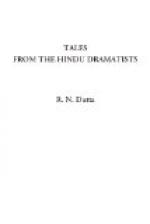His chief poems are the Raghuvansam, the Kumarasambhavam, the Meghadutam and the Ritusanharam. It is believed that he wrote a treatise on Astronomy and one on Sanskrit Prosody. His genius was of a versatile nature. He was a poet, a dramatist and an astronomer. His works bespeak the superior order of his scholarship—his acquaintance with the important systems of philosophy, the Upanishads and the Puranas;—his close observation of society and its intricate problems;—his delicate appreciation of the most refined feelings, his familiarity with the conflicting sentiments and emotions of the human heart,—and his keen perception of and deep sympathy with the beauties of Nature. His imagination was of a very high order and of a constructive nature. His power of depicting all shades of character,—high and low,—from the king to the common fisherman, is astonishing. His similes are so very apt that they touch directly the heart and at once enlist the sympathy of the reader. He is called the poet of the sentiment of Love as this sentiment was his forte. His diction is chaste and free from extravagance and is marked by that felicity of expression, spontaneity and melody which have earned for him the epithet—“the favoured child of the Muse.”
SAKUNTALA.
Of all Sanskrit dramas, Sakuntala has acquired the greatest celebrity. It is not in India alone that it is known and admired. Its excellence and beauty are acknowledged by learned men in every country of the civilised world. It was the publication of a translation of this play by Sir William Jones, which Max Muller thinks “may fairly be considered as the starting point of Sanskrit Philology.” “The first appearance of this beautiful specimen of dramatic art,” he continues, “created, at the time, a sensation throughout Europe, and the most rapturous praise was bestowed upon it by men of high authority in matters of taste.”
THE MORAL OF THE PLAY.
The recovery of the ring, like its loss, was a matter of pure accident and points to the moral that the joys and sorrows of human beings depend in most cases upon circumstances which lie beyond their control.
MALAVIKAGNIMITRA.
The play was not written at a time when Buddhism was despised, and had already been driven out of India, but when it was still regarded with favour, and was looked up to with reverence.
VIKRAMORVASI.
The root of all the stories of Pururavas and Urvasi were short proverbial expressions, of which ancient dialects are so fond. Thus—’Urvasi loves Pururavas,’ meant ‘the sun rises’; ’Urvasi sees Pururavas naked,’ meant ‘the dawn is gone’; ’Urvasi finds Pururavas again,’ meant ‘the sun is setting.’
The same ideas pervade the mythological language of Greece.




